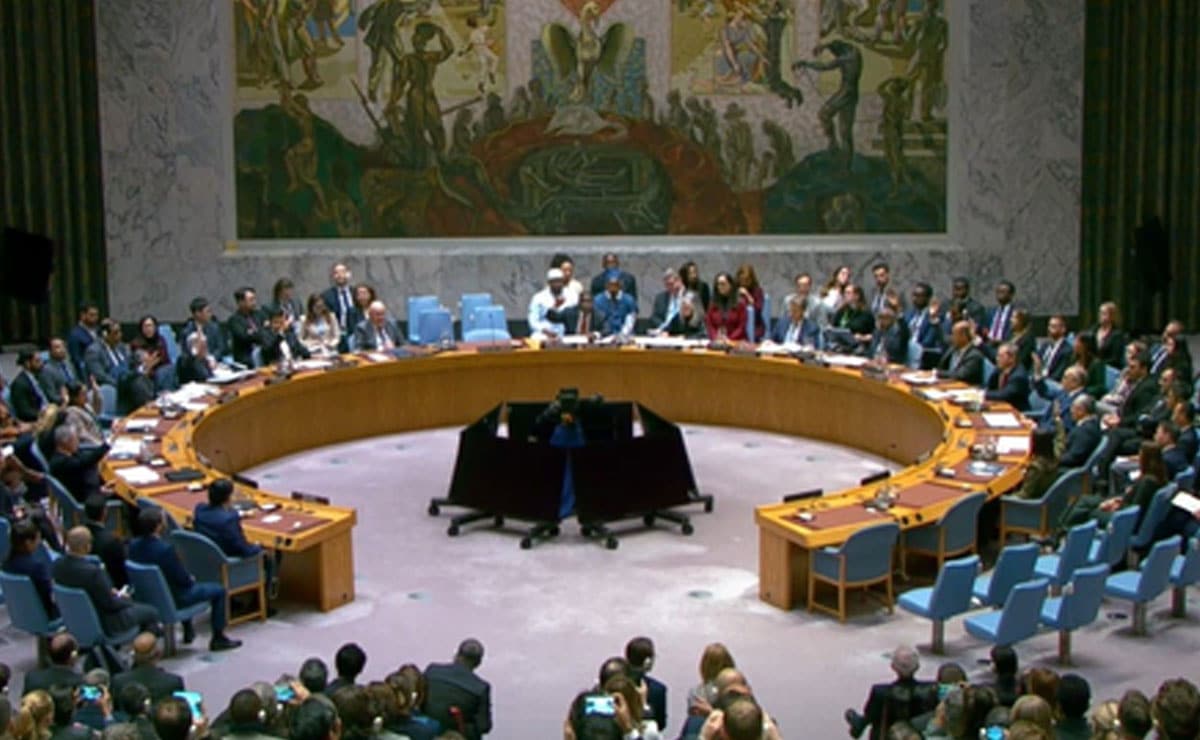UNSC approves historic resolution endorsing Trump’s Gaza peace plan; approves international force
The Security Council approved a historic resolution endorsing US President Donald Trump’s peace plan for Gaza, opening the way for deploying an international force for the devastated territory.

United Nations: The Security Council approved a historic resolution endorsing US President Donald Trump’s peace plan for Gaza, opening the way for deploying an international force for the devastated territory. The resolution adopted on Monday is a diplomatic victory for Trump, recognising the Board of Peace (BoP) headed by him that will be the transitional authority for Gaza as it emerges from a two-year catastrophe.
Trump, a vehement critic of the UN, posted on Truth Social, “This will go down as one of the biggest approvals in the History of the United Nations, will lead to further Peace all over the World, and is a moment of true Historic proportion.” Another path-breaking element in the resolution is opening a “credible pathway to Palestinian self-determination and statehood”, which the Trump administration had opposed.
Also Read:L Hyderabad Set for Big Infra Boost, Y-Flyover and Road Over Bridge Planned to Cut Travel Time
The entire 20-point Trump plan for Gaza was attached to the resolution, in an unusual action by the Council. Opposition by veto-wielding Russia, which had drafted its own motion, was overcome by the backing of Arab and Muslim countries of the US plan. Moscow dropped its resolution and abstained, enabling the resolution to go through. Algeria’s Permanent Representative Amar Bendjama said the Palestinian Authority, at the highest levels, as well as Muslim and Arab countries, backed the US resolution. But lasting peace hinged on Palestine gaining statehood.
Secretary-General Antonio Guterres welcomed the resolution and said, “It is essential now to translate the diplomatic momentum into concrete and urgently needed steps on the ground”. The resolution calls for stepping up humanitarian aid by the UN and other organisations and for unhindered access for them to Gaza. China also abstained on the resolution, which had the support of the other 13 members, including Algeria, the only Arab nation on the Council.
With the ceasefire already in force, the next phase of Trump’s peace plan requires an International Stabilisation Force (ISF) to disarm Hamas and help bring law and order to the territory, while training a Palestinian force. Countries like Indonesia, that could provide the troops, wanted Council approval for it to give a sense of legitimacy. The ISF will not be a UN peace mission or report to the Council, which was one of the sticking points for Beijing and Moscow.
The General Assembly has long called for an independent Palestine living side by side with Israel, and in September, France and Britain, along with several Western nations, announced they would recognise Palestine, leaving the US on the outside. Palestine’s statehood was conditioned in the resolution on the Palestine Authority reforms and progress on redeveloping Gaza, most of which has been reduced to rubble by Israeli bombing.
Russia’s Permanent Representative Vassily Nebenzia said Moscow appreciated “the efforts by the United States and other mediators, which have made it possible to halt the ‘hot’ phase of the Israeli-Palestinian conflict”. He said that because the Palestinian leadership and several Muslim and Arab countries favoured the US resolution, Moscow was dropping its resolution. He said that it was “a sorrowful day for the Security Council” because its powers were being “undermined” by the resolution that empowers the US. “Don’t say we didn’t warn you,” he said.
The resolution also provides a framework for international financial institutions like the World Bank to contribute to Gaza’s rebuilding. The adoption of the US resolution was the result of intense negotiations with members of the Council and other Arab and Muslim nations, with the mention of an eventual statehood for Palestine one of the compromises. On Friday, the US corralled Qatar, Egypt, the United Arab Emirates, the Kingdom of Saudi Arabia, Indonesia, Pakistan, Jordan, and Turkiye to endorse its resolution in a joint statement aimed at undercutting Russia’s opposition.
The Gaza conflict began on October 7, 2023, when Hamas attacked Israel, killing more than 1,200 people and taking 251 people hostage. Israel launched a war of retribution that continued till September 29, when the US arms-twisted Israel and Hamas to agree to a ceasefire. Hamas was made to release the hostages it still held, while Israel released some Palestinian prisoners. According to the UN, 80 per cent of buildings in Gaza have been destroyed by Israeli bombing, and the Hamas-controlled health ministry said about 69,000 Palestinians, about half of them women and children, were killed.
